Ireland's refugee hotel: 'There isn’t much to do in this town, but they’re safe'
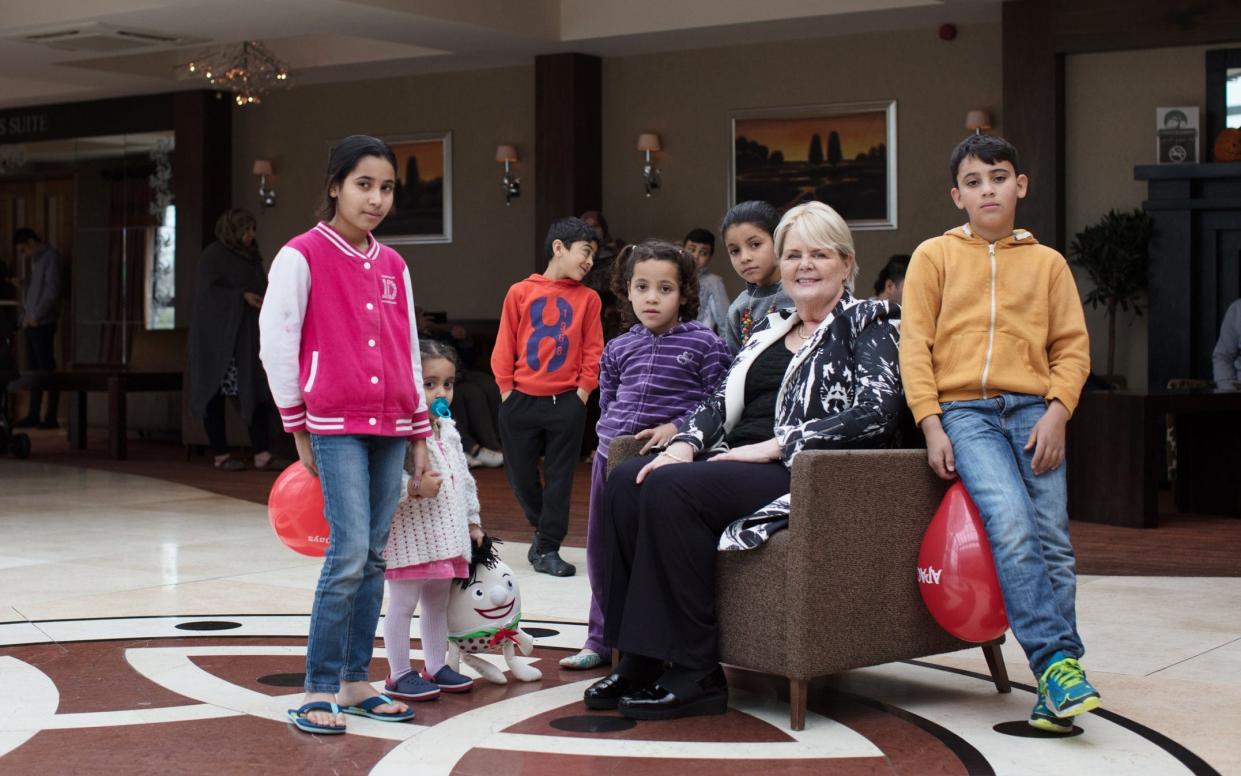
Late last year, Jackie Mullen felt something she can only describe as “a bit of a calling.” After an exhausting 25-year career managing luxury hotels around the west of Ireland, Mullen had stopped receiving any satisfaction from her work, deciding instead she’d seek an opportunity more in line with the volunteer work she’d always enjoyed in her spare time. Then, an unusual job offer arrived: would she like to become the general manager of a reception centre for Syrian refugees?
“I’m not a Holy Mary, you understand, I do not lick the church altar rails or anything. But I have my faith, and people told me this is what I had been waiting for,” she says. “I knew I had to hang up my suit, and the idea of doing something humanitarian appealed to me. Plus, I had seen the horrific images on the news, like we all had.”
Things moved quickly. In December, the Irish government – in search of sites around the country that could act as Emergency Reception and Orientation Centres (EROC) to host newly-arrived asylum seekers while they had their claims processed – announced they had chosen the small, rural town of Ballaghaderreen in County Roscommon to accommodate more than 200 refugees on a two-year contract. The first batch would arrive in just three months, they said. And that was that.
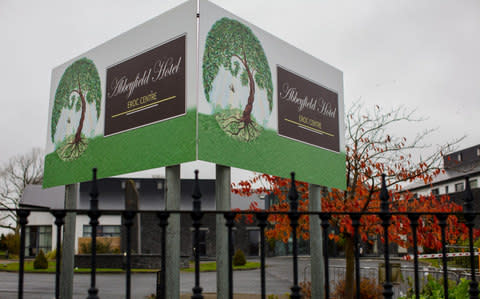
Despite having a population of only 2,000, Ballaghaderreen provided an easy solution to the government’s immediate problem. The Abbeyfield Hotel, a sprawling, low-rise building with 35 bedrooms and 29 apartments built at the end of the Celtic Tiger years but left abandoned after the economic crash, had all the facilities that families in search of sanctuary would need.
I know what it’s like to be new and feel like an outsider; a lot of Irish people do
Margaret Fields
“The people in the town didn’t have much notice at all, which meant not everybody was happy, but that was mainly due to not being consulted,” Mullen says. Within weeks, she had taken up part-time residency in the hotel (she lives an hour’s drive away, but prefers to stay on-site) and hired a small staff, ready for the first coach-load of 80 asylum seekers – many of whom had come directly from refugee camps in Greece. More followed, then more, until the hotel reached its capacity of 240 guests.
Unsurprisingly, the manner in which Ballaghaderreen, and Mullen, responded to the challenge of hosting became a national story, and drew the attention of documentary-makers over the summer. The resulting film, Hotel for Refugees, which airs on BBC on Tuesday, is a charming and even-handed account of the local reaction to a resolutely Catholic town’s population becoming 12 per cent larger – specifically, 12 per cent Syrian.
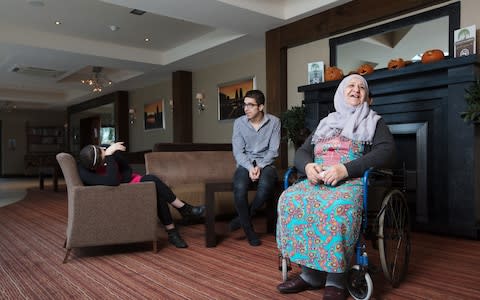
As the documentary shows, there was a small amount of ill-feeling in the local community at first, culminating in some anti-Islamic leaflets fluttering around town, but it never really took off. One couple living nearby, Ann and Martin, are shown as being sceptical at the beginning of the process as they realise they’ll have to share a pavement with strangers speaking Arabic.
“If you cannot talk to them, you get afraid of them,” Ann says in the film. “They have done nothing to me, and I hope they won’t but I’m afraid of them. I will not go walking like I used to.”
On the whole, however, the Catholic welcome proved overwhelmingly generous. The local priest threw open his doors, shops donated what they could, and the hotel was inundated with volunteer offers.
“We got unbelievable support. The two pharmacists in town put together 200 welcome packs filled with toothbrushes, wet wipes, nappies, sanitary towels and all the basics; another company gave colouring books and clothes; and dozens of people offered to help in any way they could,” Mullen says.
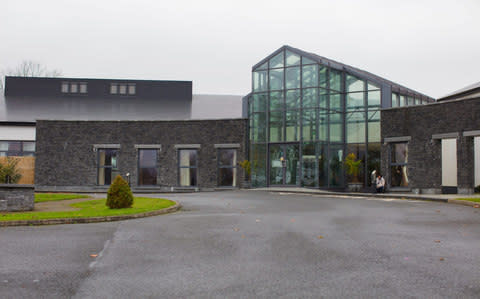
A permanently chipper 53-year-old, Mullen, who asked to be described as an “unclaimed treasure” in relation to her romantic life, doesn’t have children and enjoys the madness of kids running around the hotel (when they’re not attending the local primary school). Around 50 per cent of all residents at Abbeyfield are minors.
Among the locals offering to help was The Irish Fairy Door Company, which specialises in creating small, colourful doors for children. When they have a worry, parents can encourage children to ‘tell it to the door’ by writing it down on a notepad, and putting it inside.
On a grey day in Ballaghaderreen this week, the quiet calm familiar in the town had extended to the hotel. In the reception area, many basic signs were written in English and Arabic, a necessary requirement until the daily English classes held for all residents on and off-site do the trick. Fiddle classes, trips to Gaelic football matches advertised and Irish dancing lessons were all advertised for this week, too.
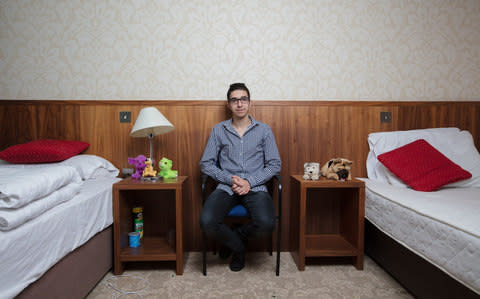
Ghassan Shmet, a 21-year-old Syrian who fled his Deir ez-Zur home with his grandmother, aunt and cousins last year, arrived in Ballaghaderreen in March. Travelling on foot to Turkey and on a packed overnight boat to Greece, the four of them spent months in a chaotic camp before he received a phone call from the UN in October.
“It said, ‘Hello Mr Ghassan, congratulations, you are moving to Ireland,’” he says, “I was so happy were were safe. I didn’t know much about Ireland, but I was so excited.” After a week or two in Dublin, he was one of the first to move to Ballaghaderreen, and has taken to the culture so much that Mullen calls him “Ghassan Paddy.” In the twin room he has to himself, an Irish flag and photos of his travels sit alongside reminders from home, including photos of his parents and siblings, who chose to remain in Syria.
“I miss my family like crazy, but I have Irish friends in every city here now, and loads in the town. My grandmother has joined the knitting group with Irish ladies, too. The best thing is the people in Ireland, they are so warm and friendly. The worst thing, I always say, is the weather.”
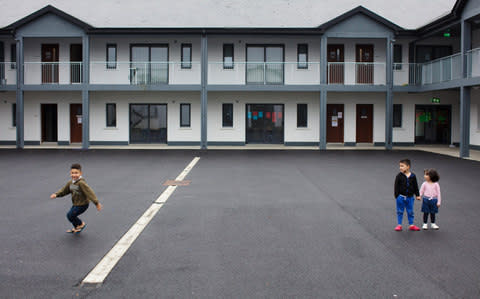
The centre strikes a balance between making the residents – who are majority Syrian, plus two Iraqi families – feel at home and preparing them for potentially living and working in Ireland. By and large, the idea behind EROCs is that every adult can gain refugee status after six months or so, allowing them to move independently and gain work. That would likely see them leave Ballaghaderreen, where they are few opportunities.
The best thing is the people in Ireland, they are so warm and friendly. The worst thing, I always say, is the weather
Ghassan Shmet
After five years they can apply for citizenship, but while the residents are here, meals are provided and cooked by Middle-Eastern chefs, sheesha can be smoked in the courtyard, and families are grouped together. Access to schools is provided, travel is permitted within Europe for two weeks at a time, and buses to the local mosque pitch up every Friday.
“We do what we can here to make them feel welcome, because the horror they’ve been through is so unthinkable,” says Margaret Fields, a receptionist who signed up to volunteer at the centre after reading about its work. “I know what it’s like to be new and feel like an outsider; a lot of Irish people do. I don’t want them to feel unwelcome, because they’re not.”
In the documentary, even those in the town who were staunchly opposed to the idea of hosting scores of refugees are seen having a change of heart.
“That’s what’s been nice,” Mullen says, “the Syrians have really given back and got involved. I know there isn’t much to do in this town, but they’re safe.”
Hotel for Refugees is on BBC One on Tuesday at 10.45pm

